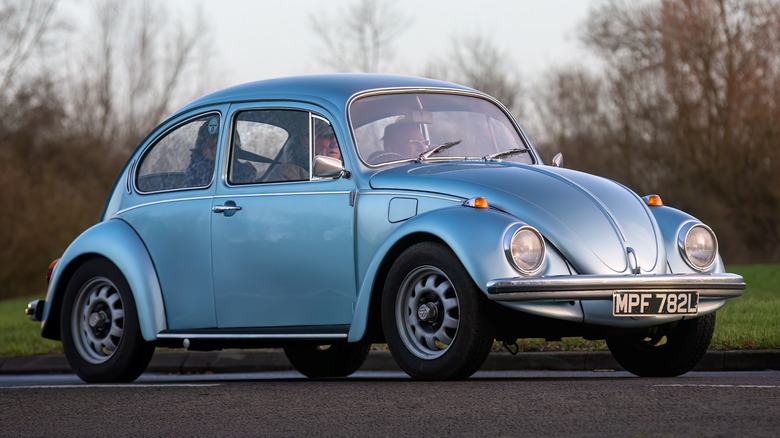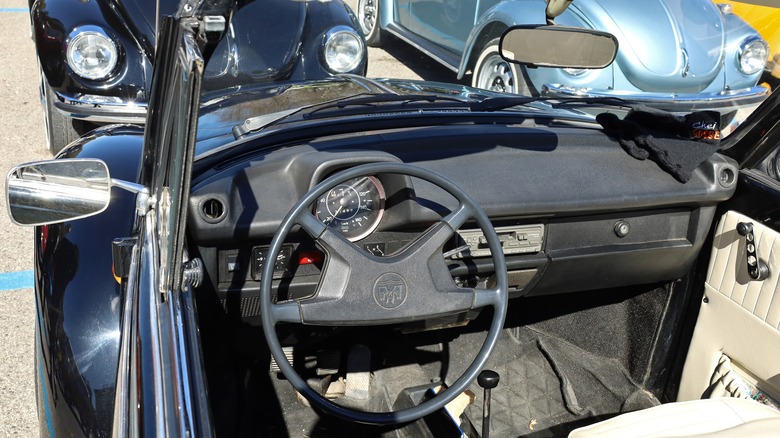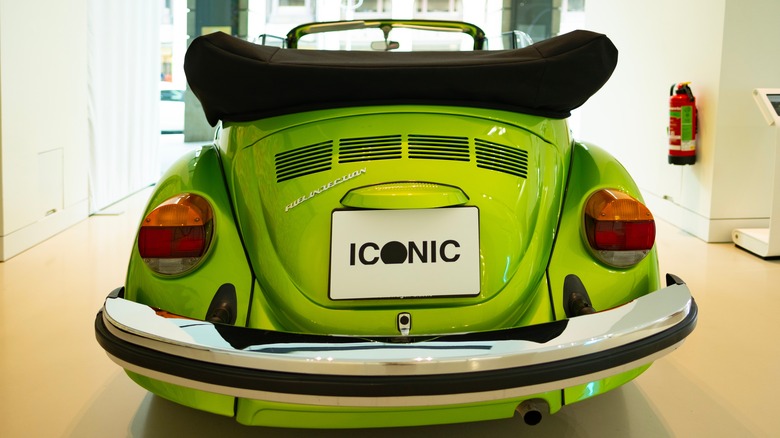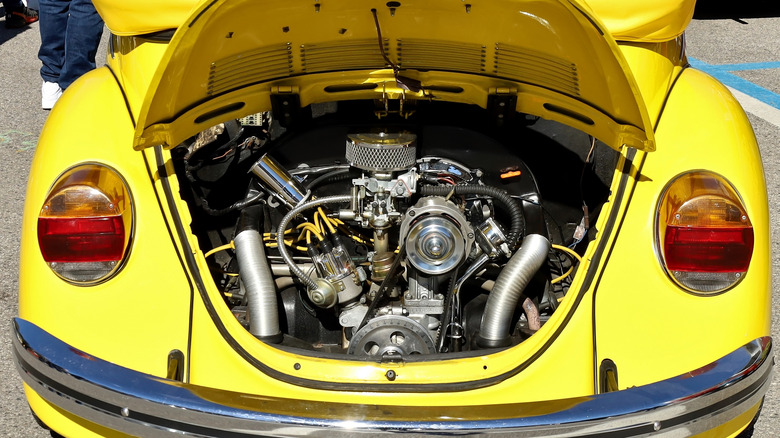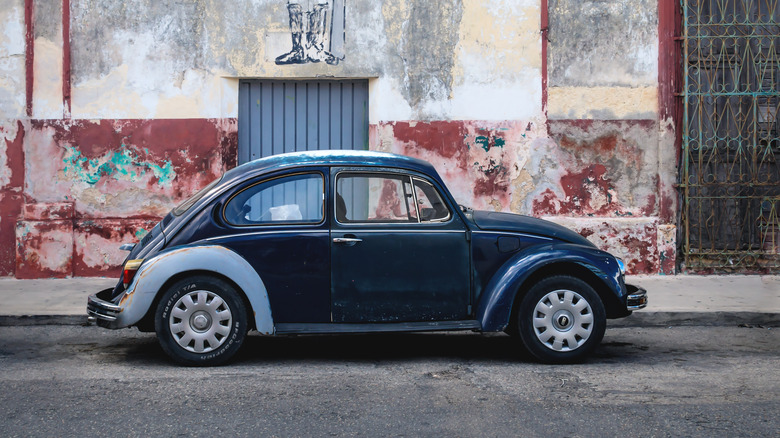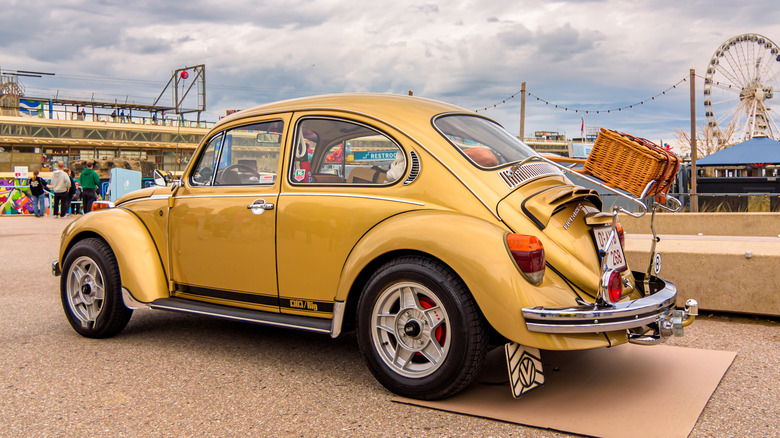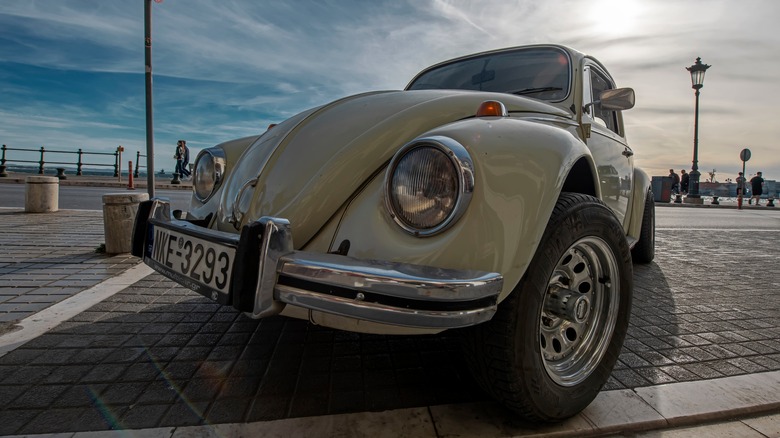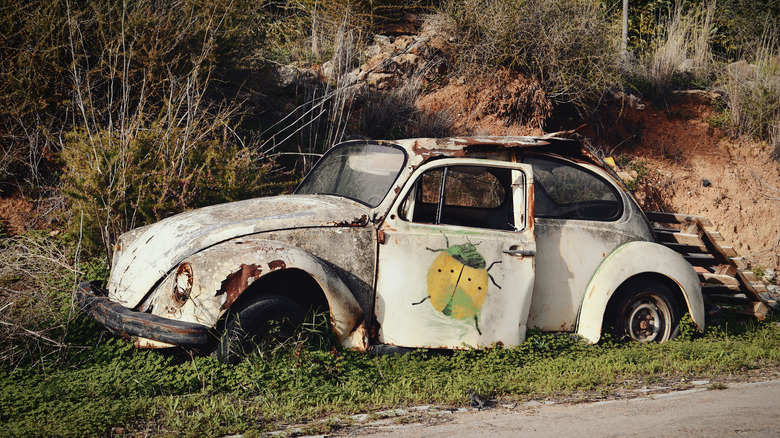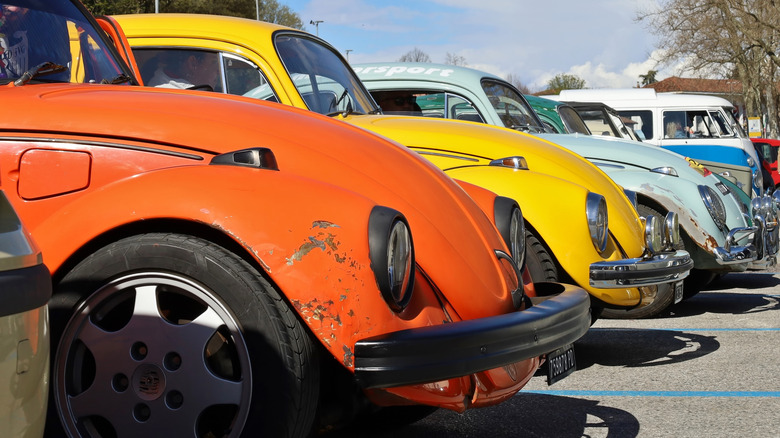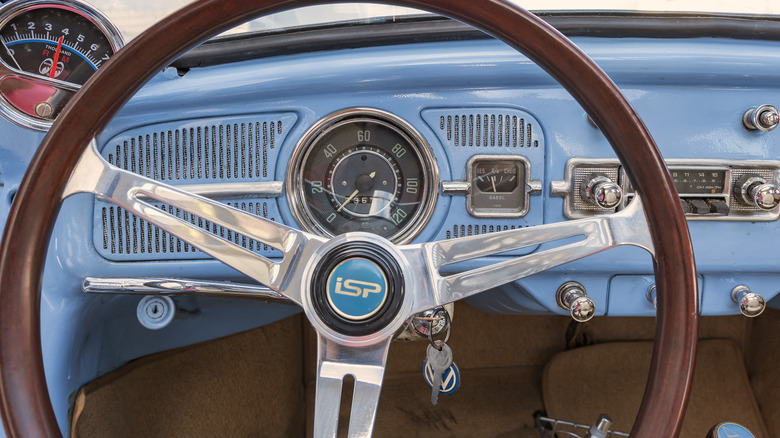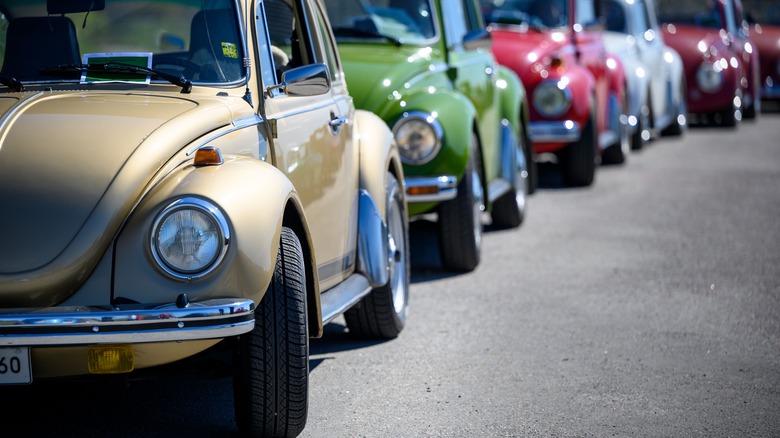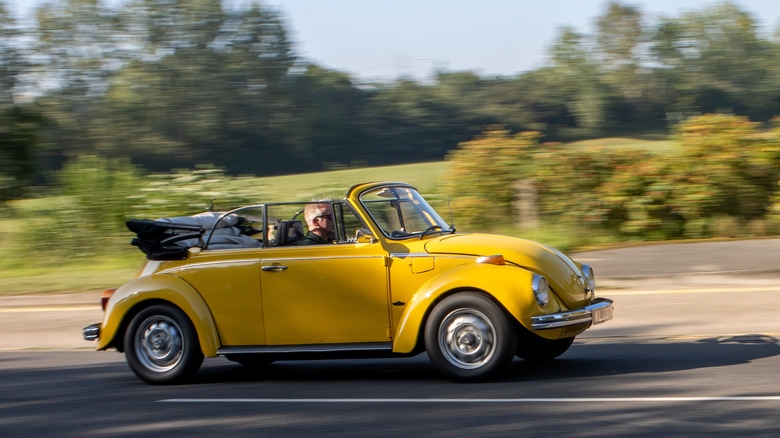11 Reasons A Classic Volkswagen Beetle Is Still Worth Buying Today
We may receive a commission on purchases made from links.
Despite how enticing a brand-new car might be, not everyone is interested in driving the newest and flashiest vehicle. Even if a used vehicle is at the top of your list, there's no reason your daily driver has to be boring. If you're considering buying an older car, there are a number of reasons a Volkswagen Beetle is not only a smart purchase, but a fun one, too.
A classic Volkswagen Beetle (think pre-1990s) is an offbeat pick to be sure, but ask anyone who's driven one, and they'll probably tell you they don't regret it! Whether it's a daily driver or a conversation piece only driven to VW events, a Beetle will turn heads. Finding one in the condition you want could be a challenge, but there's good news. With 21.5 million first-generation Beetles sold since 1945, there are plenty still on the road in the United States today — and that's not counting the modern Beetle, or the later model years manufactured in Mexico.
Whether it's a completely restored VW that is showroom ready or one that you might have to push (well, tow) home, there are many reasons a classic VW Beetle is still worth buying in modern times.
Decent gas mileage
There's no way a VW Beetle can compete with a modern hybrid, but gas mileage in the classic cars isn't awful. Achieving 25 mpg isn't unheard of, depending on driving conditions, and I easily averaged higher than that in my years of driving a 1972 Super Beetle. While gas was much cheaper then, 20-plus mpg is competitive compared to many older vehicles and even newer, bigger cars.
According to various online sources, the VW Beetle was said to get over 28 mpg off the assembly line. A self-titled expert on Quora claims that the original "KdF Wagen" (a pre-war Beetle) got 31.4 mpg, while some VW owners suggest their original user manuals said 28.5 mpg.
Part of the fuel savings might, admittedly, be due to the fact that a VW Beetle doesn't come with an onboard A/C unit. Plus, older manual transmissions typically get higher gas mileage than an automatic. Even a gasoline version of the New Beetle (diesel is also available) doesn't get a combined rate of more than 24 mpg city/highway.
The one caveat is that my car, at least, ran better on premium gas. If I used lower octane, the engine noise increased. There is already a big myth surrounding gasoline octane, so it's worth consulting your mechanic before splurging or changing things up.
Easy electric conversion
It might be a less common reason to buy a classic VW, but the fact that you can quite easily convert to electric will be a perk for many drivers. With the right parts (typically a kit), you can even convert a VW to electric in a single day, according to Electric Classic Cars.
Electric Classic Cars noted that it normally takes them a week to do a full electric conversion, so hitting that in under 24 hours was a challenge — though not impossible. A VW Beetle is easy to take apart; you can find super-old ads of mechanics doing it in about 20 seconds.
Because a classic Beetle doesn't have a ton of electrical elements (no power doors, windows, or anything else), it's quick and easy to convert to electric. Removing a gas motor and dropping in an electric one doesn't take much time, though they ran into some issues fitting the motor in that Electric Classic Cars video. Cutting off bits to make an electric motor fit in a pristine Beetle might make you shudder, but it's less of a concern with a rougher-looking Beetle. If you decide to do an electric conversion, while you're at it, you might as well install a window AC, too — some classic VW Beetles came with air conditioning from the factory, but most didn't.
Maintenance is DIY
You might think that an oil change would be the simplest at-home vehicle maintenance, but on some cars, it's not. Fortunately for VW drivers, it's easy to see and access everything on a Beetle. What's more, everything is strictly mechanical — you don't need computer diagnostics or fancy equipment to work on a Beetle.
Learning a few basic maintenance tips and tricks for a Beetle will keep your car on the road more than in the shop. If you do run into some common issues while out and about, parts are fairly easy to come by (more on that later), and there are some DIY hacks to get by until you can get into the shop.
For example, a common issue with classic VWs (according to my mechanic) is the throttle cable snapping off. Because the gas pedal is connected to the engine by way of a cable that runs from the front to the back of the car, any rough edges within that compartment can eventually saw through the cable.
In my case, I went through at least five throttle cables before my mechanic finally ordered a heavy-duty one. Anecdotally, it's possible to string together a few shoelaces, feed them through the throttle cable opening, and accelerate by way of pulling a shoestring. I don't recommend it, but I've heard it works if you have nothing else.
Enjoyable to work on
Crawling under cars isn't everyone's idea of fun, but if you enjoy tinkering with your car, an air-cooled engine is delightful to have in your garage. The first reason a classic VW is enjoyable to work on? It's simple and straightforward; there's not a whole lot that can go wrong. If something does go wrong, it's pretty easy to see what the problem is (another perk thanks to a lack of electrical components).
Since Beetles are very lightweight, there's also the upside of not needing a ton of equipment; a wheel jack and some tools will probably suffice. Different classic VWs weigh between 1,600 pounds (1949) and 1,955 pounds (1977), and 1,600 is the often-quoted average overall.
The relatively low weight also comes in handy if your Beetle breaks down. It turns out a single decently-muscular person can push the car while a second person steers, if absolutely necessary (ask me how I know).
Bonus: Though most parts are easy to find via catalog or online, in my experience, most salvage yards are going to have at least a few VWs on hand. Finding parts for a 1972 Super Beetle (or any other Super) might be challenging, but if your idea of fun is a u-pick auto parts yard, a Bug might be perfect for you.
No smog check required
The first Volkswagen Beetle arrived in the U.S. in 1949, and it's been popular ever since. The classic Beetle — the Type I — was manufactured well into the 2000s in Mexico before being discontinued. Yet not many of those newer models made it to the U.S., and instead, most VW enthusiasts continue to fight over the older "true" Beetles, most of which were manufactured prior to the 1970s.
That's great news for anyone shopping for a classic VW today: Older vehicles typically don't have to be smog-checked. There are already various places in the U.S. where you don't have to smog a car (each county seems to make its own rules) regularly, except when you transfer it during a sale. But in most states, it's based on age.
For example, in California, vehicles manufactured in or before 1975 don't need to be smogged and some states are even more friendly to classic cars. Massachusetts, for example, doesn't generally check emissions on vehicles older than 15 years — in Texas, it's 25 years. Some states won't even require a title for a vehicle over a certain age, meaning you might get away with fewer fees when buying a classic VW.
Insurance is cheap
Insurance usually depends on a combination of coverage level, driver demographics, and vehicle model and year. However, the cheaper (and older) a vehicle, the more likely you'll be able to insure it for cheap. If your car is in a bit rougher shape and you forgo full-coverage insurance, that's even better for your wallet.
Of course, if you're interested in cleaning up your classic Beetle, you might look for more insurance coverage as you build it out. This is where it can get a bit complicated, because most car insurance companies will want photos and proof that your VW Beetle is worth what you say it is. After all, the comparison vehicles vary widely too, because most improvements will involve after-market parts.
Compared to a brand-new vehicle, or even a more modern one, insuring your VW Beetle shouldn't cost an arm and a leg. Things can get complicated if you have vintage plates or a pristinely-restored car, but again, in most cases, insurance will be cheap. It's still smart to shop around, though.
Resistant to damage
Classic Beetles don't have air bags — they weren't mandated for passenger vehicles until 1999 — and if yours was built before 1968, it may not even have seatbelts, so safety isn't necessarily a top feature. However, the cars are generally durable — they can even float. You can find old commercials for VW showing the Beetle driving off a dropoff into Long Island Sound. That's not to say you should try driving into water, but it does mean you won't have to worry about water-resistance the way some newer vehicles do (the Cybertruck comes to mind).
As for anecdotes on the durability of an old Beetle, my 1972 Super Beetle killed a deer (a buck, no less) and drove away from the accident. The deer leaped onto the road from a sloping hill, so I saw it coming but couldn't get out of its path. Sad day for the deer, but not so sad for my car, which drove fine after I re-attached the passenger-side running board and replaced a headlight.
Years later, I was rear-ended by someone traveling around 25 to 30 mph (according to the highway patrol report and, apparently, the skid marks) and walked away with only minor whiplash. The car still ran after the impact, but it was later deemed a total loss because of structural damage. Also, the battery fell over and the acid ate a hole in the floor pan, so be aware of the need to secure your battery.
Replacement parts are easy to find
Whether you prefer to shop on Amazon for parts or have a local shop you frequent to pore over catalogs, there are plenty of air-cooled VW parts available in most locales. For example, Amazon has classic VW parts ranging from retro-style steering wheels to door handle kits. JBugs is a California-based retailer that ships to the lower 48 states, and Wolfsburg West is also based in California but ships to various countries around the world. A few exceptions might be non-U.S. locations or areas where it's hard to order much of anything — such as Hawaii or Alaska.
There's also one caveat here: If you have a Super Beetle, it might be harder to track down parts. You might also have to argue with the tire shop staff when they swear that your suspension is off and want to bring out the sawzall to "fix" it. On the same note, properly sized tires are also important, and could be hard to find for some. In my experience, in a rural area with only four tire shops within a 30-mile radius, I was able to secure 165/80 R15s with no problem.
Not everything has to be original, of course, and aftermarket upgrades are part of the fun. But in most cases, you can order everything you need to completely rehab a VW Beetle online, from steering wheels to floor panel kits to a new ignition key.
It can run forever with some TLC
One of the great things about a simple, classic car is that it could theoretically live forever. While it's true that classic VWs stopped being produced in the U.S. due to emissions, the cars are still allowed on the road. With regular maintenance and plenty of spare parts, a Beetle can run practically forever.
Even if you need to replace the engine, your Beetle's "shell" is still the same. Or, you could swap engines and leave the chassis behind. If you need to go as far as replacing the entire floor pan, there are parts for that too. Parts — especially for the interior, like all-new seats — can sometimes get expensive, but you can also find used parts and keep on driving.
There are also options when it comes to choosing parts, like upgrading your engine or, as mentioned, going full-electric. Ultimately, if your Beetle gets too banged up to be a daily driver, there are even some fun modifications (like a roll bar) you can make to turn it into a dune buggy for off-roading fun. Or, you can chop it off and convert to a convertible — the options are pretty much endless.
Cheap to buy
Depending on the year, Volkswagen Beetles can come cheap — a project car might only run you a few hundred dollars. When the Beetle was first sold in the '50s, it had a price tag of $1,600. In today's dollars, that's nearly $20,000, and you can buy a classic VW for far less. You might not be able to buy a running Beetle for less than $1,000 today, but considering the price of any used car, that's not unreasonable.
However, some models are pricey, especially in good condition, and a split window VW will probably never be cheap. A fully-restored Beetle could cost tens of thousands of dollars, and there is apparently no shortage of well-heeled buyers looking to snatch them up. That also means the potential for some earnings via resale if you spruce up a Beetle and flip it.
On the same note, there are also lower-end Volkswagen Beetles up for sale that you can turn into a project car or, eventually, a daily driver. The best advice for finding a gem you can work with is to scour the local advertisements, both newspaper-based and online. Craigslist can be a great place to start your search, and so can Facebook Marketplace.
Consider this a warning: Once you search for VW Beetles for sale on Facebook, you'll probably get ads forever (although, is that a bad thing?).
Fun to drive
There are a lot of things to consider before you buy a classic VW, but anyone who's owned one can tell you that there aren't a lot of drawbacks. There are some cool features on old Beetles that somehow make them more exciting to drive than more modern cars.
There's also an added social factor when you hit the road: I've never driven my Super Beetle past another Beetle and not had the driver wave at me. There's camaraderie in driving any classic car, and Bugs have a fan base all their own. That also means plenty of swap meets, meetups, and even some races — my mechanic was known to win a few back in the day.
Given how fun it is to drive, a classic VW makes a sweet first car — and not just for teenagers in the 1970s. Contrary to popular belief, they're not just compact cars for tooling around town. Sure, they're great for that, but they also handle well on the freeway (but you didn't hear it from me). When your first car is a VW Beetle, you learn very quickly just how fast they can go, and that makes any potential drawbacks less of a concern.
